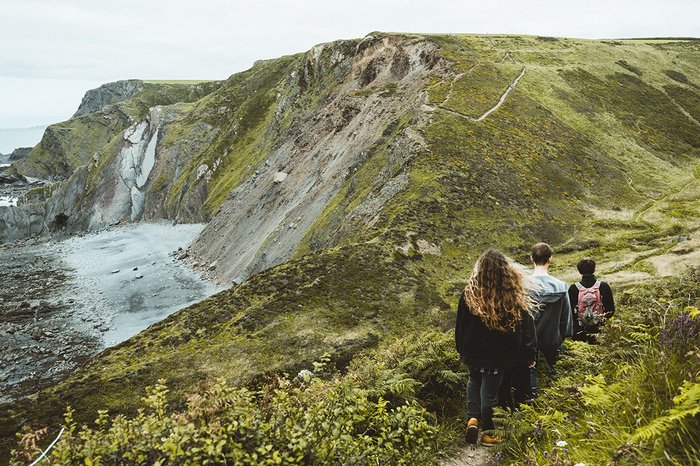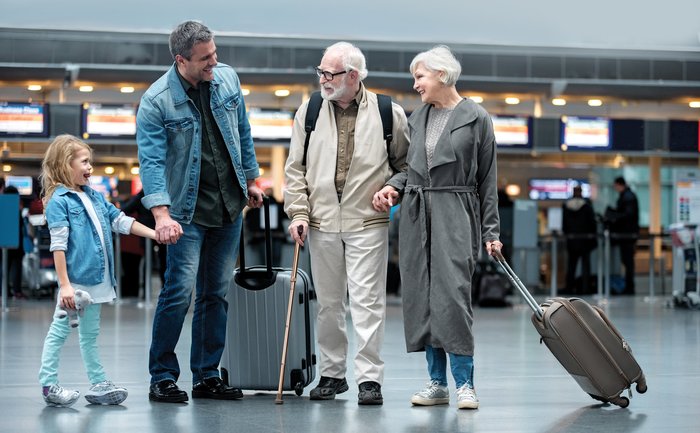What do I need to think about before I go away?
If you are planning a holiday or travelling for work or pleasure, you need to have a planned way of receiving dialysis while you are away. This is known as Dialysis Away from Base (DAFB) or holiday dialysis.
Speak to your kidney team about your plans and try to give them as much notice as possible. DAFB requires extra planning, for example arranging hospital paperwork and booking available dialysis slots near to the location you are travelling to.
What if I am on peritoneal dialysis or home haemodialysis?
If you are on peritoneal dialysis, it is normally possible to take your equipment and go away for a few days, or on holiday. Exchanges can be done anywhere clean with a sink. Speak to your kidney team or the company that supplies your peritoneal fluid to arrange for supplies to be delivered to your accommodation. You may be able to take supplies with you if you’re going on a short trip. Ideally your fluid should be booked to arrive two days before you get to your destination, so it is ready for when you get there.
If you are using a portable home haemodialysis machine, discuss your plans with your home therapies team as they can advise and arrange transport for your machine. Make sure your insurance covers a portable dialysis machine. Travel insurance companies often don’t insure dialysis machines, but these should be covered under your household contents insurance, so speak to your home insurance company to check. Finally, remember to pack a plug adapter for the right voltage at your destination if travelling abroad.
More information can be found on the Kidney Care UK travel hub.

Can I travel in the UK?
Talk to your kidney team about going away. They may already have systems or notice periods in place, and may also want to check that you are fit to travel.
Once you have found a destination, discuss organising DAFB with your kidney team. It is best to give them as much notice as possible, ideally four or more weeks. This is so they can help you find somewhere to dialyse at, or near, your intended destination. Dialysis capacity at some locations can be limited, so you may have to consider dialysis further away.
There can be a lot of logistics involved with booking a trip when you are on dialysis. Kidney Care UK Dialysis Freedom is a free service for UK patients and kidney units to book DAFB.
What is Kidney Care UK Dialysis Freedom?
Kidney Care UK Dialysis Freedom is a free support service to help with the planning and arranging of DAFB in the UK.
DAFB is available to all NHS kidney patients and is organised directly by your kidney unit. However, the forward planning, co-ordination and booking of haemodialysis slots can be challenging.
Kidney Care UK Dialysis Freedom is here to help you every step of the way. The service will handle all arrangements and administration, so you only have to prepare as you would for any other trip and focus on the benefits of your break.
Do I have to pay for DAFB in the UK?
You do not have to pay to receive DAFB in the UK. The cost of your treatment is covered by the NHS.
What else do I need to know about DAFB in the UK?
There are no restrictions on the number of times you can receive DAFB, but you should discuss any plans with your kidney team each time you travel.
DAFB slots must be booked in advance of your trip, otherwise there may not be capacity to provide you with the care you need.
If you are away for over a month, your kidney team will arrange for a handover of your clinical care to a hospital closer to where you will be staying.

Can I travel abroad?
As with going away in the UK, the first thing to do is talk to your kidney team. Try to give at least three months’ notice before travelling abroad when on dialysis.
Think about where you want to travel to and start looking for dialysis units in that area that offer holiday dialysis. Your kidney team may be able to help, but you will also have to do your own research.
Do not book a holiday before confirming that there is somewhere you can dialyse.
Will I have to pay for dialysis abroad?
Talk with your kidney team about how dialysis in the country you are travelling to will be paid.
Generally, countries can be grouped into three main categories:
- Countries within the EU (as well as Switzerland, Norway, Iceland and Liechtenstein)
- Countries with a reciprocal healthcare agreement
- Countries without a reciprocal healthcare agreement
EU countries and Switzerland, Norway, Iceland, Liechtenstein
Make sure you have a valid Global Health Insurance Card (GHIC) or in-date European Health Insurance Card (EHIC) if you are travelling in the EU, or in Switzerland, Norway, Iceland, or Liechtenstein.
Confirm with your kidney team that your treatment will be covered by your EHIC/GHIC card. You will not be able to reclaim any treatment costs when you return home.
Dialysis can be arranged for free in EU countries with state-run haemodialysis units. Some EU countries will ask for a fee called a co-payment and you will be responsible for this. This can be as much as 20% of the total cost of your haemodialysis treatment abroad and the NHS will not be able to refund this cost.
What are GHIC and EHIC cards?
A Global Health Insurance Card (GHIC) or a European Health Insurance Card (EHIC) allows you to get treatment such as dialysis at a state-run unit for free, or at a reduced cost in a country with a reciprocal health agreement with the UK.
GHIC and EHIC cards are available free of charge. You can apply for a card on the NHS website or by calling 0300 330 1350.
What is a reciprocal healthcare agreement?
This is an agreement between the UK and another country about medical care. It means you should be able to receive dialysis in these countries for free, or at a reduced cost.
Countries with a reciprocal healthcare agreement
Dialysis can also often be arranged for free in countries with a reciprocal healthcare agreement with the UK, including parts of Australia and New Zealand.
Countries without a reciprocal healthcare agreement
If you are travelling to a country without a reciprocal healthcare agreement with the UK, or if you have dialysis in a private clinic, then you will have to pay the full costs of your treatment. Make sure you understand the costs and how they are expected to be paid before travelling.
Please be aware that receiving dialysis abroad can be extremely expensive.

What about travel insurance?
Travel insurance is vital. Most standard policies do not cover kidney disease and it is likely that your insurance costs will be higher than someone who does not have a long-term health condition.
Here are a few tips for finding the right medical travel insurance:
- Research how much your insurance will cost in advance.
- Don’t put off buying insurance until the last minute. Arrange it as soon as you book your travel.
- Contact a few different providers to compare policy costs. A list of medical travel insurance companies is available on the Kidney Care UK website.
- When speaking with an insurance company, start the conversation by explaining your kidney condition, so you don’t waste time with a company that won’t insure you.
- Never withhold any details about your health, or you risk invalidating your policy. Be honest with the insurance company, even if that means having to search around.
- Once you find a suitable company, check exactly what is covered by their insurance.
- Consider buying annual insurance to see if you can get a better price than for a single trip.
- Try to insure everyone who is going on holiday with you on the same policy, even if the other people do not have a medical condition. That way, if you have to make a claim, the people you are travelling with can claim too. For example, if you have to cancel a holiday because of a medical emergency, if you are all on the same policy, the cancellation will include everyone you are travelling with.
- Remember to take insurance documents with you in case you need to make a claim when you are away.
For more information go to the Kidney Care UK travel hub.
Are there any risks to travelling abroad while on dialysis?
There is a risk of acquiring blood-borne viruses such as hepatitis B, hepatitis C, and, to a lesser extent, HIV while travelling abroad.
High risk areas include the Indian subcontinent and some countries in Africa. This doesn’t mean that you can’t travel to these places, but you should talk to your kidney team to understand the potential risks. Your kidney team can also check your hepatitis B immunity and arrange a vaccination if needed before you travel.
They can also discuss what changes may need to be made to your dialysis schedule when you return home.
Can I travel abroad if I am on the transplant list?
Yes, but you should discuss your travel plans with your kidney team so they can temporarily remove you from the list until you return.
You will not lose any time points while you are off the list.
Travelling to the Indian subcontinent, Africa, and other parts of the world may result in suspension from the list until virology tests have confirmed you have not become infected with a virus such as hepatitis or HIV.
Can I fly if I am on dialysis?
Yes, but it is important to plan flights around your dialysis as you should not miss a treatment in order to travel. If you have to travel on a certain day, talk to your kidney team first as they may be able to rearrange your regular session.
Make sure you take enough medication with you to cover your stay, including EPO injections. If possible, take more medication than you need in case you are delayed. It is a good idea to carry your repeat prescription with you, with details of all your prescribed medications.
Check with your travel provider, or airline, about their policies on carrying/declaring medications and medical equipment such as a peritoneal dialysis machine, as there may be a charge if you are flying outside the European Economic Area (EEA). You may need a letter from your hospital to support this.
The following services should be available at European airports:
- Facilities to summon assistance at arrival points, such as at terminal entrances, at transport interchanges and in car parks.
- Assistance to reach check-in and help with registration, assistance moving through the airport and getting on and off the plane.
- Free carriage of medical equipment and up to two items of mobility equipment.
The gov.uk website has information about more support services on planes and at airports.

What about diet?
An important part of many holidays is enjoying food and drink that you don’t usually have at home. If you have been advised to follow certain dietary guidance, talk to your kidney dietitian about what you may need to consider while away. It’s also recommended that you follow standard health advice when it comes to food and drink in countries where sanitation is poor. This includes:
- Using bottled water for drinking and brushing your teeth.
- Avoiding ice in drinks.
- Avoiding any food that will have been washed in tap water such as salads or uncooked fruit and vegetables.
Can I get a grant to help with the cost of a holiday?
You may be able to apply for a Kidney Care UK grant towards the cost of a holiday in the UK or overseas.
You can also contact us at [email protected] or call us on 01420 541 424.
Where can I find more information?
The Kidney Care UK travel hub offers lots more information, support and guidance about travelling when you are living with kidney disease:
- You can find out more about Kidney Care UK Dialysis Freedom on their website, via email at [email protected] or call 01509 808 668.
Dialysis Away from Base (DAFB) : download or order Kidney Care UK's information leaflet
You can download our Dialysis Away from Base (DAFB) leaflet for free.
You can also order a printed copy of Kidney Care UK’s Dialysis Away from Base (DAFB) leaflet to be sent to you in the post.

Publication date: 01/2024
Review date: 01/2027
This resource was produced according to PIF TICK standards. PIF TICK is the UK’s only assessed quality mark for print and online health and care information. Kidney Care UK is PIF TICK accredited.